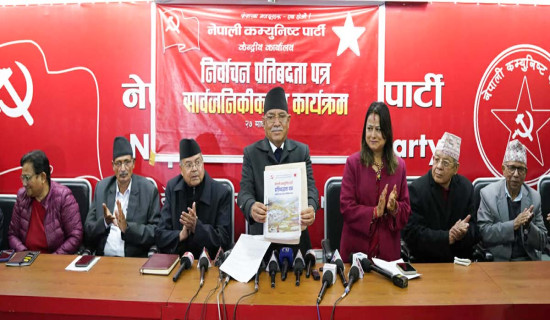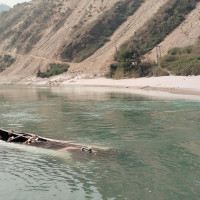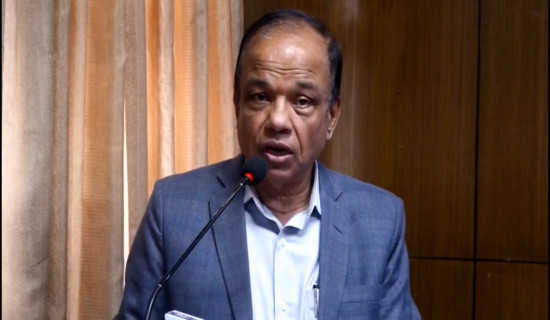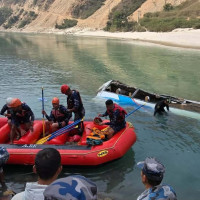- Wednesday, 11 February 2026
Violence Must Not Be Condoned
No acts of violence and other illegal activities like arsoning, killing, destruction of private and public properties and burgling are acceptable for any cultured society. But, Katmandu witnessed such unimaginable mob violence on March 28 when the pro-monarchists staged street protests aiming at reinstating the monarchy and a Hindu state. The protesters happened to turn more ferocious when ‘commander’ of the pro-royalist movement Durga Prasai, vice-chairman of Rastriya Prajatantra Party (RPP) Rabindra Mishra, RPP general secretary, lawmaker Dhawal Shumsher Rana, among others, reportedly asked their supporters to break the security cordon. They found much fewer participants in the showdown than they had expected.
The protesters started entering the prohibited areas and getting involved in violent activities such as pelting stones and bricks at the security forces, setting government vehicles, offices and private houses on fire and snatching away weapons from the security personnel. They not only attacked the offices of Kantipur Television and Annapurna Post but also caused damage to the CPN (Unified Socialist) office and Herbs Production & Processing Co. Limited’s factory.
Liberal attitude
Initially, the security personnel deployed at Tinkne, Koteshwar and nearby areas were taking their utmost restraint as the government was in favour of allowing the agitating groups to hold peaceful protests. But the Kathmandu District Administration Office had no alternative but to impose a curfew in the tense areas to protect the lives and properties as the mob violence escalated like anything. Two persons (a television cameraman and a protester) lost their lives. The journalist was found burnt inside a private building at Tinkune, while the protester died in a gunshot. Had the security forces taken harsh measures to tackle the protesters, the latter would not have been able to cause such devastations.
Major political parties and the people from different sections of Nepali society have heavily come down on ex-king Gyanendra and his supporters for their irresponsible behaviours. The ruling as well as opposition political parties have demanded that ex-king Gyanendra be held accountable for the loss of lives and properties caused during the protests as that hostile situation was created due to his growing ambition for returning to power. His desire for getting restored as a monarch appears to be just a fantasy.
The former king must not forget the historical fact that his own steps to gain power and his despotic rule were responsible for the abolition of the 240-year-old monarchy from Nepal, to a great extent. He and his followers must also keep in mind that the present federal constitution was drafted by the Constituent Assembly that was elected by the people. As per the will of the people, the first meeting of the same body had taken the historic decision regarding the extermination of the monarchy 17 years back. Thus, it is not as easy for the pro-royalists to reverse the system of governance as they think.
The government has apprehended more than 100 individuals, including RPP leaders and Rana, for their alleged involvement in destructive activities. Chief coordinator of the pro-royalist movement Nawaraj Subedi has been put under house arrest. Although Gyanendra did not have a good relationship with the octogenarian Subedi during the Panchayat period, the former found the latter to be a suitable person to work as the chief coordinator to mobilise the masses.
The government has initiated necessary investigations into their illegal activities. Meanwhile, the police administration has intensified its search for Prasain. With a not-so-good track record, Prasain was detained in November last year on charges of committing cybercrimes. He was released on bail. The government must bring all the violence mongers to justice at the earliest possible to discourage such activities.
Selfish elements
Some selfish internal elements are supposed to have been active in intensifying their campaigns for restoring the outmoded monarchy in the country. They want to use the monarchy as a tool to gain power. Amidst political instability, they seem to have remained effortful in fishing in troubled waters. So, the governing as well as opposition parties need to join hands to safeguard and institutionalise the hard-won federal democratic republic.
Similarly, the external forces that do not want Nepal to have peace, stability and development are also playing games with the country. Their efforts, too, will surely be in vain as federalism is getting institutionalised gradually. The narrative that the country has been in the doldrums because of the federal system of governance is untrue. Over the past decades, the country has made wonderful progress on different fronts, and it is heading towards the path of development and prosperity. However, much remains to be done. In fact, kingship cannot be an alternative to democracy.
So, the political parties that played a crucial role in making Nepal a federal democratic republic must also act more responsibly. As the pro-royalists are attempting to cash in on the growing frustrations among the people, especially youths, the political parties need to make all efforts possible to improve the service delivery system. They must also realise the necessity for them to focus on creating jobs, accelerating the process of socio-economic development and controlling corruption.
(The author is a former deputy executive editor of this daily.)





-square-thumb.jpg)


-square-thumb.jpg)








